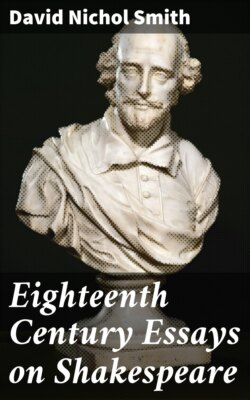Читать книгу Eighteenth Century Essays on Shakespeare - David Nichol Smith - Страница 13
На сайте Литреса книга снята с продажи.
Sir Thomas Hanmer.
ОглавлениеTable of Contents
Sir Thomas Hanmer's edition of Shakespeare, in six handsome quarto volumes, was printed at the Clarendon Press in 1743–44. As it appeared anonymously it was commonly called the “Oxford edition.” It was well known, however, that Hanmer was the editor. Vols. ii., iii., and iv. bear the date 1743; the others, 1744.
Hanmer had been Speaker of the House of Commons from 1713 to 1715, and had played an important part in securing the Protestant succession on the death of Queen Anne. He retired from public life on the accession of George II., and thereafter lived in “lettered ease” at his seat of Mildenhall near Newmarket till his death in 1746. It is not known when he undertook his edition of Shakespeare, but the idea of it was probably suggested to him by the publication of Theobald's edition in 1733. His relative and biographer, Sir Henry Bunbury, writing in 1838, refers to a copy of this edition with corrections and notes on the text of every play in Hanmer's handwriting. There can be no doubt, however, of the accuracy of Warburton's statement that his edition was printed from Pope's, though the hastiest examination will prove the falsity of Warburton's other remark that Hanmer neglected to compare Pope's edition with Theobald's. He relied on Pope's judgment as to the authenticity of passages and on Theobald's accuracy in collation. Thus while he omits lines which Pope had omitted, or degrades them to the foot of the page, he often adopts Theobald's reading of a word or phrase.
He had certainly made considerable progress with the edition by May, 1738, when he was visited by Warburton (see Nichols, Illustrations, ii. 44, 69). It was still incomplete in March, 1742, but it was sent to the printer at the end of that year, as we learn from a letter of 30th December to Zachary Grey, the editor of Hudibras: “I must now acquaint you that the books are gone out of [pg liii] my hands, and lodged with the University of Oxford, which hath been willing to accept of them as a present from me. They intend to print them forthwith, in a fair impression adorned with sculptures; but it will be so ordered that it will be the cheapest book that ever was exposed to sale. … None are to go into the hands of booksellers” (Nichols, Literary Anecdotes, v., p. 589). Earlier in the year, in the important letter concerning his quarrel with Warburton, which will be referred to later, he had spoken of his edition in the following terms: “As to my own particular, I have no aim to pursue in this affair; I propose neither honour, reward, or thanks, and should be very well pleased to have the books continue upon their shelf, in my own private closet. If it is thought they may be of use or pleasure to the publick, I am willing to part with them out of my hands, and to add, for the honour of Shakespear, some decorations and embellishments at my own expense” (id. v., p. 589). The printing of the edition was not supervised by Hanmer himself, but by Joseph Smith, Provost of Queen's College, and Robert Shippen, Principal of Brasenose. We find them receiving instructions that there must be care in the correction of the press, that the type must be as large as in Pope's edition, but that the paper must be better.
These facts are of interest in connection with Hanmer's inclusion in the fourth book of the Dunciad. In a note by Pope and Warburton he is referred to as “an eminent person, who was about to publish a very pompous edition of a great author, at his own expense”; and in the poem the satire is maladroitly aimed at the handsomeness of the volumes. Warburton afterwards implied that he was responsible for the inclusion of this passage (id., p. 590), and though the claim is disputed by Hanmer's biographer, the ineffectiveness of the attack would prove that it was not spontaneous. Pope, however, would yield to Warburton's desire the more readily if, as Sir Henry Bunbury had reason to believe, the anonymous Remarks on the Tragedy of Hamlet, published in 1736, was the work [pg liv] of Hanmer,35 for there Pope's edition was compared unfavourably, though courteously, with that of Theobald. (See the Correspondence of Sir Thomas Hanmer, 1838, pp. 80, etc.)
